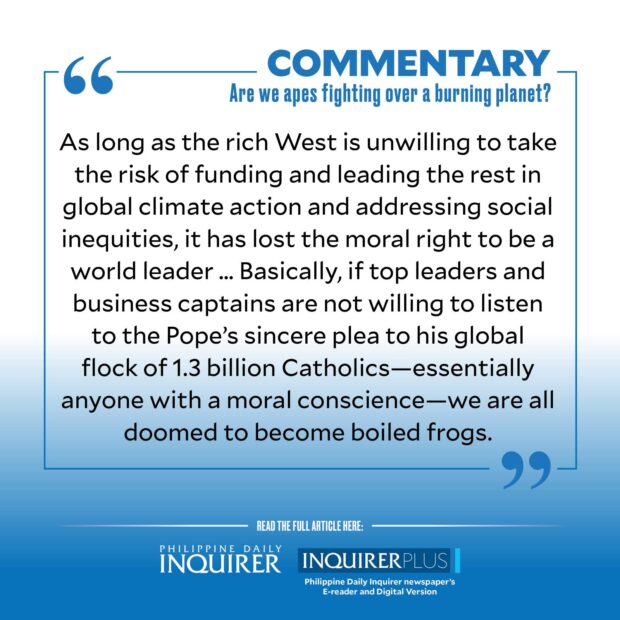How to Cope With an Unending Series of Polycrisis Facing the World
This summer marked the hottest temperatures ever recorded, but daily reports continue to flood in about natural disasters and devastating floods. The rise of artificial intelligence is disrupting both jobs and businesses. Meanwhile, the media’s coverage of the war in Ukraine is so chaotic that it’s impossible to determine who is winning or losing, except for the terrible toll of lives lost and injuries sustained each day.
Debt levels are reaching distressing heights, even as interest rates remain high. Geopolitically, the United Nations (UN) secretary general has referred to the situation as an “unhinged world.” The recent UN Security Council meeting failed to reach any agreements, with only United States President Biden being present among the five permanent members. At present, only 12 percent of the 17 UN Sustainable Development Goals (SDGs) for 2030 have been achieved.
This dystopian reality leaves little trust in leaders’ ability to guide us away from the impending apocalypse. The multidimensional nature of these crises makes finding a single solution impossible. There is no quick fix because it requires a fundamental change in human behavior, which is deeply ingrained in excessive consumption fueled by debt, leading to increased carbon emissions and ecological destruction.
While scientists have sounded the alarm about the physical effects of climate change, economists have remained optimistic, believing that the solution lies in the imposition of carbon taxes by governments or the establishment of carbon trading markets. However, as businesses have a stronghold on politics, most democracies are hesitant to impose carbon taxes. Without proper governmental regulations, carbon markets are chaotic and rife with scams.
For most people, the urgency of reducing carbon emissions takes a backseat to more immediate concerns such as income generation to support their families. Politicians have failed to communicate that safeguarding human capital (our well-being) and natural capital (planetary well-being) are interconnected. Pope Francis emphasized this connection in his apostolic exhortation “Laudate Deum”. He stated, “our care for one another and our care for the earth are intimately bound together.”
Managing change isn’t an insurmountable task. The challenge lies in the vast scope and diverse nature of different communities, cultures, and values, each with their own resources and histories. Ultimately, any meaningful change requires sacrifices and trade-offs, demanding leadership that is willing to take risks and knows where to find the necessary funds for transformation.
As climate disasters disproportionately affect the poor, exacerbating social injustice, we must address ways to improve incomes and alleviate inequality while simultaneously tackling environmental issues. The book “Buying Time for Climate Action” demonstrates that the knowledge and resources needed to achieve the SDGs already exist within universities and businesses. However, this knowledge is not readily accessible to the millions of villages and small-scale activists striving for change. The digital divide exacerbates the poverty divide, and this neglect of climate change by businesses may well be the root of their profit model.
It took businesses a decade to recognize that climate change is not an expense that reduces their profits, but rather a profit opportunity. As long as they continue to make money, little will change. The UN Conference on Trade and Development’s latest report reveals that the top four global companies in the food trading sector control nearly 70 percent of the global food market, and their profits have dramatically increased from 2021 to 2022. The same can be observed in the fertilizer, energy, pharmaceutical, and other industries selling essential commodities, despite billions struggling to access basic food and healthcare.
The wealthy West has become increasingly self-centered and protective of their status quo. Even Sweden, which was once known for its generous support of development aid, has succumbed to pressure from its right-wing government. Consequently, Sweden and other European countries are scaling back their commitments to provide 0.7 percent of their GDP for overseas development aid in order to finance their 2 percent GDP commitment to the North Atlantic Treaty Organization defense spending.
Are we behaving like apes, fighting over a burning planet? As long as the affluent West refuses to take the lead in global climate action and address social inequalities, they forfeit the moral authority to be world leaders. This moral corruption by the wealthy elite is exactly what historian Arnold Toynbee noted as the cause of the decline and fall of civilizations.
If top leaders and business executives are unwilling to heed the sincere plea of Pope Francis to his global community of 1.3 billion Catholics, anyone who possesses a moral conscience, then we are all destined to become proverbial boiled frogs. Asia News Network
Denial of responsibility! Vigour Times is an automatic aggregator of Global media. In each content, the hyperlink to the primary source is specified. All trademarks belong to their rightful owners, and all materials to their authors. For any complaint, please reach us at – [email protected]. We will take necessary action within 24 hours.


